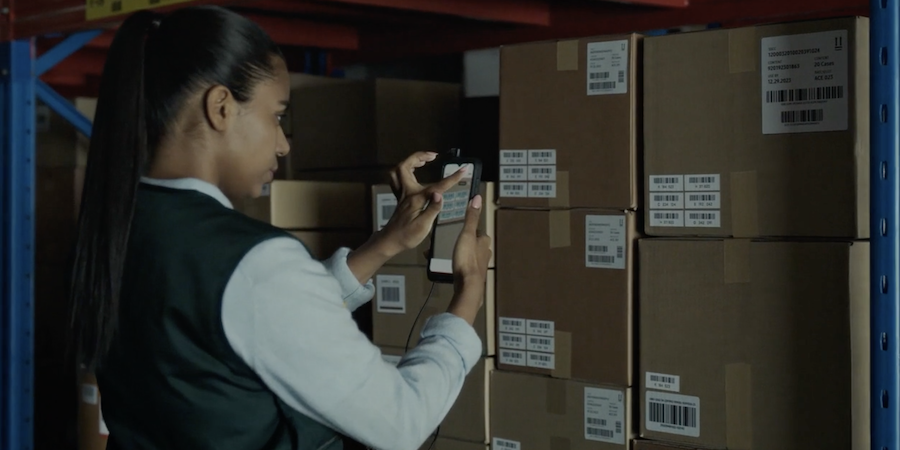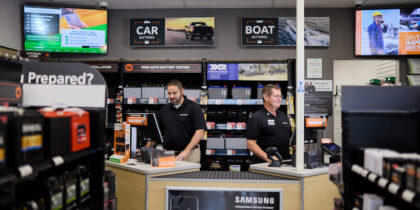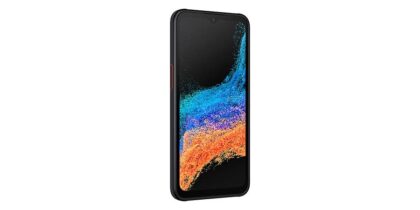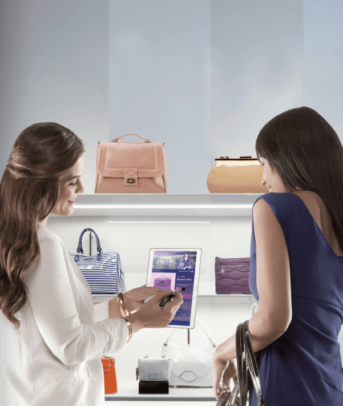Retailers have been focused on digital transformation for more than a decade, but until recently, those efforts (and investments) typically centered around customer engagement and operational efficiency. Meanwhile, retail associates have continued to rely on walkie-talkies, single-purpose scanning devices, shared computers and other legacy technology — meaning a customer with a mobile app might have more inventory insight than a store employee. But that dynamic is changing as mobile solutions begin to reach frontline retail workers.
Faced with growing consumer demand for omnichannel experiences, forward-thinking retailers are investing in solutions that help associates do more with less. And those solutions are increasingly mobile. In fact, 93 percent of retailers plan to increase their in-store use of consumer mobile devices by 2025.
Of course, mobilizing the frontlines isn’t as simple as handing out smartphones. Connected Associate (CA) programs from Samsung are designed to put the right mobile work tools into employee hands, democratizing data and easing friction in the associate journey. Samsung customers such as Walmart, Kroger and Sally Beauty use enterprise-grade Samsung smartphones — ruggedized for work and loaded with apps that help them work more efficiently and effectively — to improve operational efficiency, as well as the employee and customer experience.
No two brands are the same, but successful deployments have a few things in common. So what should retailers consider in designing a CA program?
What associates want from a CA program
Retail workers are just as mobile-centric as their customers. People are more likely to adopt (and use effectively) devices that are familiar, with a user experience that’s similar to the apps and social media platforms they use in their daily lives. The more intuitive the mobile experience, the less training workers will need to incorporate these solutions into their workflows.
Questions to consider:
- Who are the frontline workers in this organization?
- Who needs a device?
- What problems do they need solved, and what do they want to accomplish with their devices?
Which apps/functionality they need
With the right apps and integrations, retail employees can use their phones as a human resources (HR) hub where they can check their schedules, request days off, trade shifts and clock in/out. They can check inventory, scan product barcodes and process contactless transactions from the sales floor. Perhaps most importantly, they can communicate with co-workers across a variety of channels.
Retailers can build their own associate apps or use off-the-shelf software that integrates with existing systems, including apps for:
- Peer-to-peer communications (via walkie-talkie, chat, video call and file sharing)
- Workforce management
- Task management
- In-store order fulfillment (ISOF)
- Point of sale (POS)
Samsung has built retail-friendly capabilities into rugged versions of Galaxy smartphones and tablets, including the new Galaxy XCover6 Pro and Galaxy Tab Active4 Pro. This includes programmable buttons with push-to-talk (PTT) functionality for a walkie-talkie experience, as well as Knox Capture camera-based barcode scanning.
Questions to consider:
- Which tasks does each frontline team perform?
- What information do they need to access?
- How do they prefer to communicate with each other?
To share, or not to share
Sharing devices comes with a lower upfront investment, but it also means employees need to spend the first few minutes of each shift tracking down a device and hoping it has enough battery life left for the remainder of their shift. When each employee is assigned their own device, they can individually ensure their device is ready to go when they start work.
Some retailers are even adopting a Company-Owned/Personally Enabled (COPE) model, letting employees use their work devices as personal smartphones. Devices protected by built-in Samsung Knox can effectively separate work apps from personal data, creating both a Work and a Personal space on the device. When associates are on the clock, they can log into their work profile to access work apps and data. When they’re off the clock, they can log into their personal profile to access personal apps and data.
Questions to consider:
- Do we want employees to share devices, or should each person have their own?
- Do we want to allow these work devices to also be used for personal tasks?
How to protect mobile devices
A well-designed CA program can improve associate productivity, employee engagement and the customer experience — all of which boosts the bottom line. It’s a smart investment, and one that needs to be protected.
Samsung offers mobile devices that look and function like consumer-grade devices but have been semi-ruggedized for work environments. For example, both Galaxy XCover6 Pro and Galaxy Tab Active4 Pro have received MIL-STD-810H certification, meaning they can withstand constant vibration, extreme temperatures and up to 4-foot drops without a case (5-foot drops with case). They’re also IP68 certified, meaning they’re dust-proof and water-resistant.
Retailers also need policies and technology, such as Samsung Knox Guard, that help protect devices in the case they’re lost or stolen.
Questions to consider:
- How can we prevent devices from getting broken?
- How do we retrieve them if they’re lost or stolen?
How to scale deployments and manage devices
Configuring, deploying, managing and updating hundreds or thousands of devices across multiple locations is a big undertaking, but retailers don’t have to go it alone.
Transform retail associate performance
Get your free guide to empowering retail associates with mobile devices and data. Download Now
Samsung is experienced at creating custom, scalable solutions for retailers. That includes helping retail partners define and refine their strategy, test options and implement management best practices at scale. Samsung works closely with customers’ IT departments to optimize deployments using Knox Suite, a collection of device management solutions that streamline the process. For example, Knox Mobile Enrollment lets enterprises bulk enroll a large fleet of devices — over Wi-Fi or LTE — so IT doesn’t need to touch every device, and associates don’t need to do anything to get their new devices up and running. Knox Suite tools also let retailers create a customized user experience for associates, push that setup to the whole fleet and remotely manage and secure all those devices at scale.
Once devices are deployed, Knox Asset Intelligence (KAI) helps retailers ensure they’re getting the most out of their investment. It analyzes mobile device usage to identify challenges with any or all of the devices — such as nonresponsive or sluggish apps, Wi-Fi connectivity fluctuations and battery health — and provides insights into how to solve problems. For example, if a device’s battery is draining too quickly, KAI can identify whether devices are being recharged properly or whether specific device settings or apps are draining the battery.
Samsung also maintains a strong partner ecosystem, with off-the-shelf software solutions and a full suite of accessories tailor-made for Galaxy devices. Samsung offers device setup, repair services and 24/7 tech support. This way, associates get the tools they need to work more efficiently and effectively — without overtaxing IT or putting device/data security at risk.
Questions to consider:
- How do we set up, deploy and manage fleets of devices for the front lines, as quickly as possible?
- How do we ensure the IT burden isn’t too high?
Samsung’s smart retail solutions help you reconnect associates and consumers, your way. Discover more about how you can empower retail associates with mobile devices and data in this free guide.






